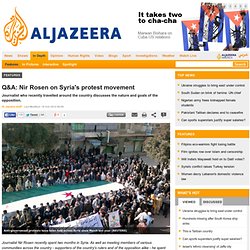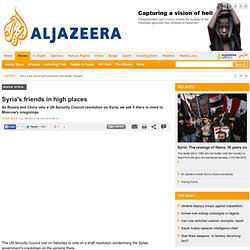

The Regime - PBS - Syria Undercover. Q&A: Nir Rosen on Syria's protest movement - Features. Journalist Nir Rosen recently spent two months in Syria.

As well as meeting members of various communities across the country - supporters of the country's rulers and of the opposition alike - he spent time with armed resistance groups in Homs, Idlib, Deraa, and Damascus suburbs. He also travelled extensively around the country last year, documenting his experiences for Al Jazeera. This is the second in a series of interviews he gave to Al Jazeera since his return. Read the first part here. Al Jazeera: What is the social background of the protesters? Nir Rosen: In much of the country, entire communities are involved in the uprising. In many opposition strongholds people are socially conservative. AJ: What are the demographics of protesters and opposition leaders? NR: Most protesters are in their late teens to mid 20s, but in many areas one can see middle-aged and even elderly men taking part. AJ: To what extent are different religious communities participating?
AJ: Who leads the opposition? Syria's friends in high places - Inside Syria. The UN Security Council met on Saturday to vote on a draft resolution condemning the Syrian government's crackdown on the uprising there.

But Russia, Syria's last remaining ally in the region, warned that the resolution does not demand enough of the groups opposing the government of President Bashar al-Assad. Moscow has also made it clear that any transfer of power must be a decision made from within and nothing less. This comes as Sergei Lavrov, the Russian foreign minister, and Mikhail Fradkov, the chief of Russia's foreign intelligence service, prepare to travel to Syria on Tuesday to meet al-Assad. These diplomatic developments are set against a backdrop of growing violence. Activists reported on Saturday that the Syrian army had killed 200 people since Friday. The UK-based Syrian Observatory for Human Rights cited witnesses as saying that 138 of the dead had been killed in the Khaldiyeh neighbourhood of Homs. So, just what are Moscow's misgivings? Syrian Instability: How Would Rest of World Respond? RAY SUAREZ: I’m joined now by Joshua Landis, co-director of the Center for Peace Studies at the University of Oklahoma.

He was a senior Fulbright Scholar in Syria in 2005 and runs a website called SyriaComment.com. And Steven Heydemann, a political scientist and senior adviser for Middle East initiatives at the United States Institute of Peace. Joshua Landis, the White House has all but ruled out military intervention. What does the world community have left after the U.N. vote turning down the resolution? JOSHUA LANDIS, University of Oklahoma: Well, it’s clear that nobody — we’re in a you-first situation, where everybody is expecting somebody else to intervene militarily. The problem is that Syria is a big country, 24 million people. So what’s likely to happen is that, increasingly, they’ll begin to fund and arm the Syrian opposition and that this will be fought out over a long period of time on the streets of Syria and in places like Homs.
STEVEN HEYDEMANN, U.S. Exclusive report on Syria's citizen journalists.